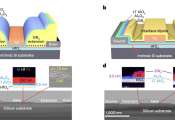Carbon nanotube–based MOSFETs doped using a scalable technique
In recent years, electronics engineers have been trying to identify materials that could help to shrink the size of transistors without compromising their performance and energy efficiency. Low-dimensional semiconductors, ...









